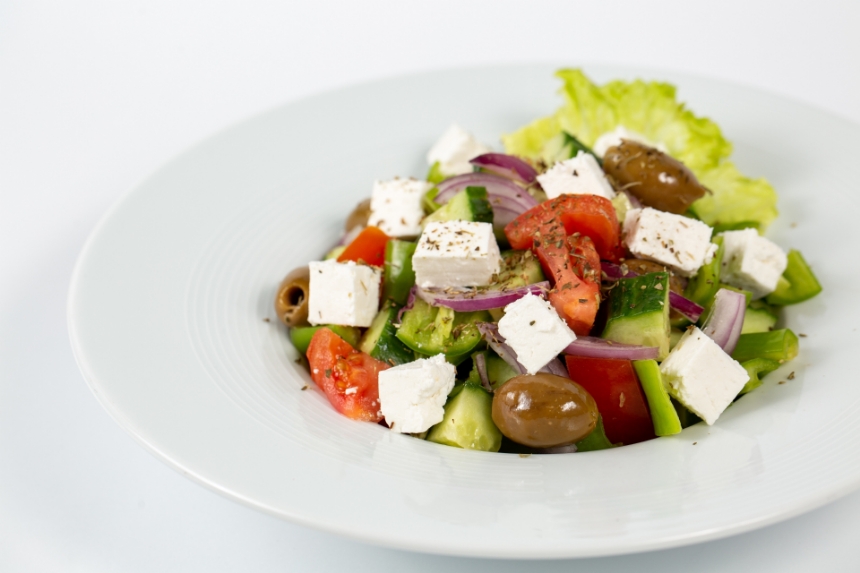
History and Cultural Significance
The Greek Salad, also known as Horiatiki, has a fascinating history that dates back centuries. In ancient Greece, this dish was a simple combination of locally sourced ingredients, showcasing the abundance of the region's agricultural produce. It was primarily consumed by farmers and shepherds as a filling and nutritious meal during long working hours. Over time, the Greek Salad gained popularity among all social classes and became an integral part of Greek cuisine.
Ingredients and Preparation
A true Greek Salad is a refreshing ensemble of vibrant colors, flavors, and textures. The key ingredients include fresh tomatoes, crisp cucumbers, tangy onions, succulent olives, and creamy feta cheese. These primary components are typically accompanied by aromatic herbs like oregano and a drizzle of extra virgin olive oil, which adds a distinctive Mediterranean touch to the dish. The salad is best enjoyed with a squeeze of lemon juice and a sprinkle of sea salt.
To prepare the Greek Salad, start by washing and chopping the vegetables into bite-sized pieces. The tomatoes should be ripe and juicy, while the cucumbers should have a firm and crunchy texture. Next, thinly slice the onions and drain the olives to remove excess salt. Finally, crumble the feta cheese over the salad and add a generous amount of olive oil and a pinch of dried oregano. Toss all the ingredients together gently and let them marinate for a few minutes to allow the flavors to blend.
Health Benefits of Greek Salad
Beyond its irresistible taste, Greek Salad offers numerous health benefits that make it a wise dietary choice. Firstly, it is low in calories and high in fiber, making it an excellent option for weight management. The abundance of fresh vegetables ensures a good intake of essential vitamins and minerals, while the olives and olive oil provide heart-healthy monounsaturated fats. Furthermore, the feta cheese offers a good source of protein and calcium. The combination of these nutrient-rich ingredients contributes to improved digestion, enhanced immunity, and overall well-being.
The Importance of Fresh and Local Ingredients
To truly savor the authentic flavors of a Greek Salad, it is crucial to prioritize the use of fresh, locally sourced ingredients. This ensures optimal taste and nutritional value while supporting sustainable agricultural practices. By choosing organic produce, you can minimize exposure to pesticides and contribute to a healthier environment. Additionally, purchasing from local farmers fosters community development and helps preserve traditional, artisanal methods of food cultivation.
Conclusion
Greek Salad, with its rich history and mouthwatering flavors, has successfully made its mark in the culinary world. By combining fresh vegetables, aromatic herbs, and a drizzle of olive oil, this Mediterranean dish represents the true essence of Greek cuisine. Its vibrant colors, refreshing taste, and health benefits make it a favorite among food enthusiasts globally. So, next time you're craving a wholesome and authentic Mediterranean delight, indulge in a Greek Salad and experience the gastronomic wonders it has to offer.
We invite you to share your thoughts on Greek Salad in the comments section below. Have you tried this delightful dish, and what variations have you come across? Don't forget to share this article with your friends and family, spreading the joy of Greek cuisine!
Here is a recipe for Greek salad:
Ingredients:
- 4 large vine tomatoes, cut into wedges
- 1 cucumber, peeled, deseeded, and chopped
- ½ red onion, thinly sliced
- 1 cup pitted Kalamon olives
- 1 teaspoon dried oregano
- 8 ounces feta cheese, crumbled
- 4 tablespoons extra virgin olive oil
- 2 tablespoons vinegar
- 1 teaspoon salt
- ½ teaspoon black pepper
Instructions:
- In a large bowl, combine the tomatoes, cucumber, onion, olives, oregano, and feta cheese.
- In a small bowl, whisk together the olive oil, vinegar, salt, and pepper.
- Pour the dressing over the salad and toss to coat.
- Serve immediately, or chill for later.
Tips:
- For a more authentic Greek salad, use heirloom tomatoes if you can find them.
- If you don't have red wine vinegar, you can use white wine vinegar or balsamic vinegar.
- You can also add other vegetables to your Greek salad, such as green bell pepper, zucchini, or eggplant.
- If you want to make a vegetarian Greek salad, omit the feta cheese.
- Serve your Greek salad with crusty bread to soak up all the delicious juices.
Enjoy!











